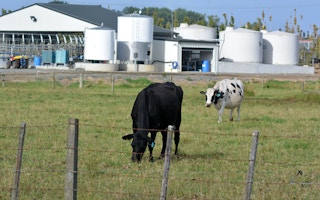New Zealand’s reputation as a clean, safe food exporter is again at risk after police said they are investigating a threat to poison baby formula.
Letters sent to Fonterra Cooperative Group Ltd, the world’s biggest dairy exporter, and Federated Farmers of New Zealand in November threatened to contaminate baby formula with the pesticide 1080 unless the government stopped using it by the end of this month, police said in Wellington on Tuesday. Tests of more than 40,000 samples had found no trace of the poison, the government said.
The threat comes after a botulism scare in 2013 prompted a global recall of some Fonterra products and an import ban by China until it was proved to be a false alarm. Dairy is New Zealand’s largest foreign exchange earner, accounting for 29 per cent of overseas sales in an economy where exports make up about a third of output.
“While a threat is a long way from reality, the mere hint highlights the importance of New Zealand’s food safety regime,” said Cameron Bagrie, chief economist at ANZ Bank New Zealand Ltd. in Wellington. “The coming month will be critical and will depend on the extent to which foreign competitors play up the development, with a view to undermining New Zealand’s reputation and market credentials.”
The New Zealand dollar dropped to a five-week low of 72.57 US cents on the news. It bought 72.73 cents at 10:45 a.m. in Wellington.
‘Eco-terrorism’
Prime Minister John Key labelled the poison threat “eco-terrorism” and said the probability of it being carried out was “extremely low.”
“
We are advised it’s extremely unlikely anyone could deliberately contaminate formula during the manufacturing process and there is no evidence this has occured.
John Key, prime minister, New Zealand
He defended the more than three-month delay in going public with the threat, telling Radio New Zealand on Wednesday the police investigation could have been impeded by earlier disclosure.
“We wanted to be able to tell consumers with confidence that the products were safe,” Key said. “And of course the threat in the letter said that we had until the end of March to change our use of 1080.”
Trade partners including China were informed in February and have been briefed on the steps New Zealand manufacturers and the government were taking, Scott Gallacher, deputy director-general of the Ministry for Primary Industries, said at a news conference Wednesday.
China scrutiny
China’s General Administration of Quality Supervision, Inspection and Quarantine said it is stepping up scrutiny of imported New Zealand milk powder. It must have a government certificate and an importers’ examination report to prove it doesn’t contain 1080, the agency said on its website.
New Zealand markets itself internationally as a “100% Pure” food exporter and tourist destination. The slogan has been called into question by China’s official news agency Xinhua, which said in 2013 that buyers of Kiwi goods were losing faith in its clean, green image.
China is the biggest customer for New Zealand dairy exports, which are worth NZ$14 billion ($10 billion) a year.
“We can fully assure our customers and consumers that all of our milk and products are safe and of high quality, and our supply chain continues to be secure and world-class,” Fonterra said in a statement.
Shares in the Fonterra Shareholders’ Fund, a publicly traded trust that tracks the cooperative’s dividend payout and earnings, rose 3 cents to NZ$5.83 at 10:35 a.m. in Wellington. They fell as much as 1.2 percent to NZ$5.78 yesterday.
Synlait Milk Ltd., 39 per cent owned by China’s Bright Dairy & Food Co., extended its decline, falling 1.7 per cent to the lowest since August 2013.
Nothing unusual
New Zealand’s Financial Markets Authority said Wednesday it hadn’t detected any unusual dairy-related trading in recent months. The regulator has no reason to believe last week’s 13-per cent drop in whole milk powder futures traded on the NZX was connected to the poison threat, it said in an e-mailed response to questions.
The anonymous letter writer threatened to contaminate infant and other formula with 1080 and make their demand public unless New Zealand stopped using the pesticide by the end of this month, police said. The letters were accompanied by small packages of milk powder that subsequently tested positive for the presence of a concentrated form of 1080.
Supermarket limits
Supermarket owner Foodstuff New Zealand imposed a limit of two cans of baby formula per person to ensure product is available to all customers, it said on its website. Shoppers will be subject to heightened surveillance and extra security measures are in place to safeguard the goods, it said.
Animal rights groups such as the World League for Protection of Animals say 1080, or sodium monofluroacetate, which is used in New Zealand to control pests such as rats and opossums, causes a slow and horrific death.
Bill Wallace, co-leader of the Ban-1080 political party, said he doesn’t know who’s responsible for the threat and labeled the protest “crude” and “totally inappropriate.”
“This to me is over-the-top, endangering New Zealand’s whole exports,” he told NZ Newswire. “The reason I formed a political party was so people could protest by ticking a box every three years and that’s a pretty harmless protest. But to me, this is just radical.”
Key said the government would not stop using 1080, without which native birds such as the flightless kiwi “would be extinct in 50 years.”
Every measure has been taken to protect the food system and “we are advised it’s extremely unlikely anyone could deliberately contaminate formula during the manufacturing process and there is no evidence this has occured,” Key said.








